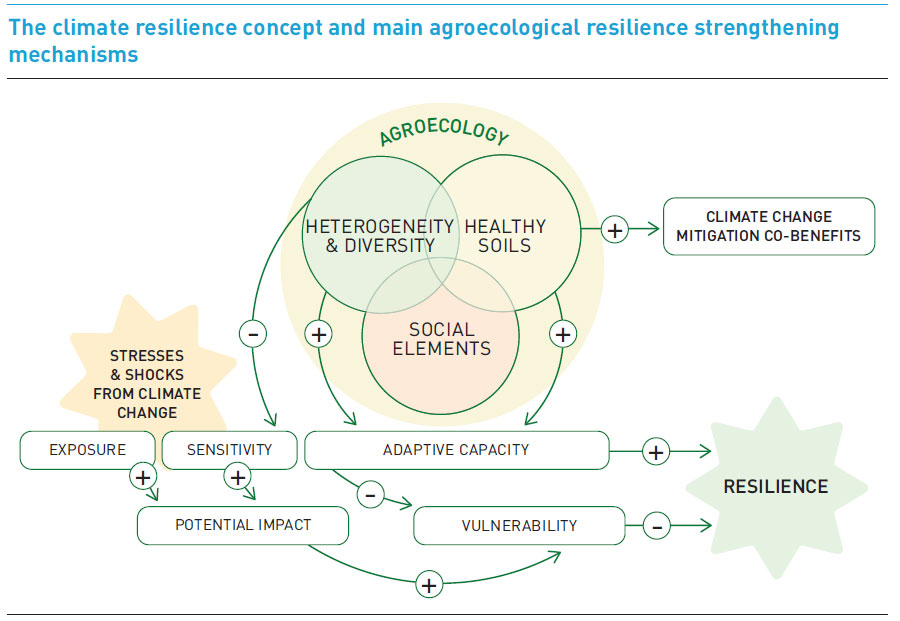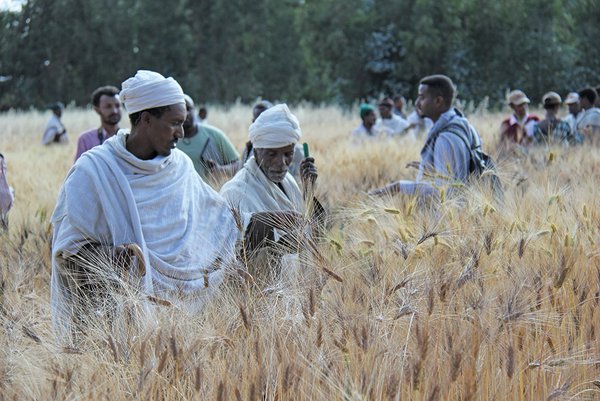 Download this article in magazine layout
Download this article in magazine layout
- Share this article
- Subscribe to our newsletter
The potential of agroecology to build climate-resilient livelihoods and food systems
Agroecology builds on key management characteristics which strengthen climate resilience (see Figure). To begin with, it is based on ecological principles, with a strong focus on high levels of biodiversity, overall diversity and heterogeneity (integrating different breeds, varieties and species into agricultural production), and healthy soils. It also takes into account social aspects, in particular the co-creation and sharing of knowledge and the promotion of local and traditional knowledge.
Economic aspects are considered as well, e.g. through diversification of economic activities (diversification of varieties and species grown/raised on the farm, integrated systems), which mitigates the risk of single-crop yield losses. Mitigation co-benefits are also achieved, mainly related to increased soil organic carbon (carbon sequestration) and reduced synthetic fertiliser use through otherwise improved soil fertility. And last but not least, institutional aspects, such as knowledge co-creation and dissemination via advisory services and farmer-to-farmer approaches have a key role to play in supporting the development, improvement and uptake of agroecology.

Evidence of agroecology’s potential to increase climate resilience
A broad-based study examined the potential of agroecology to build climate-resilient livelihoods and food systems (see Box). It revealed that agroecology not only can foster climate change adaptation and increase resilience but also contribute to a low-emission pathway. The results of this study support the claim that agroecology should be acknowledged as a powerful approach to transform agricultural production systems for a more sustainable and climate-resilient future.
Agroecology is gaining momentum in the international policy arena, in particular in the United Nations Framework Convention on Climate Change (UNFCCC) and its Koronivia Joint Work on Agriculture (KJWA). Furthermore, an increasing number of countries and stakeholders from different backgrounds see agroecology and related approaches as a means well-suited to attain adaptation and mitigation targets and to achieve effective transformational change in agricultural sectors. For instance, an analysis of 136 countries’ nationally determined contributions (NDCs) demonstrates that ten per cent of them refer to agroecology as a promising approach to address climate change. Isolated agroecological approaches are also mentioned in NDCs, mainly related to the core agroecological principles according to FAO, namely “efficiency”, “recycling”, “diversity” and “co-creating of knowledge”. These are often associated with alternative conceptions of production systems such as conservation agriculture, climate-smart agriculture, etc.
Lessons learned from Kenya and Senegal
To gain a better understanding of the ecological and socio-economic resilience performance of agroecology according to the 13 indicators of agroecosystems resilience of Cabell and Oelofse (2012), and mobilising the FAO SHARP tool (Self-evaluation and Holistic Assessment of climate Resilience of farmers and Pastoralists), comparative field studies were conducted in Kenya and Senegal. Overall results show that agroecological farmers have significantly higher resilience levels than the control group (non-agroecological). In both countries and despite very different contexts, spatial and temporal heterogeneity as well as integration and sharing of traditional knowledge appear to be factors that enhance resilience of these systems.
This study reveals that:
- Agroecology enhances social and human capital. The ability of agroecological farmers to self-organise allows them to form broader social safety networks that buffer them against disturbances including both climatic and economic impacts. The rich traditional knowledge and wider management skills passed down through generations within agroecological farms also contribute to their adaptive capacity. Agroecological farmers appear not to be reactive to climatic and other shocks but are able to anticipate and plan their adaptation processes in accordance with the past and current events. This is made possible by a plethora of different learning and information-sharing mechanisms that seem to be more widespread among agroecology farms compared to their conventional counterparts.
- Diversification within agroecological farms builds their natural capital. Higher levels of biological diversity in these farms improve biogeochemical processes like nutrient and water cycling and increase soil organic matter levels that add to soil fertility and overall soil health. These processes are fundamental for resilience building and adaptation to climate change. Furthermore, diversification of different aspects of food systems is a crucial element in enhancing performance and efficiency that could manifest into increased resilience, reduced risks and maintained stability of food production in the wake of shocks and stresses.
A window of opportunity
The case studies from Kenya and Senegal show that in both countries, despite different policy settings, there is considerable potential for agroecology to gain recognition as a resilient and sustainable production approach. However, it is challenging to translate the interdisciplinary and systemic nature of agroecology into policies, laws and strategies. Both case studies highlight the importance of training and awareness-raising activities to create a common and systemic understanding of agroecology and to ensure that it is embraced by appropriate institutional frameworks.
Based on the study, the following series of recommendations are drawn, targeted to donors, decision-makers and researchers:
- Given the existing evidence, agroecology should be acknowledged as a powerful approach to transform agricultural production systems for a more sustainable and climate-resilient future.
- Existing financial flows to agriculture should be better channelled according to agroecological aspects.
- Complexity ought to be embraced, and a more systemic understanding of challenges and solutions to hedge against climate change has to be gained by breaking silos and working across agricultural sectors.
- Investment in research on agroecological approaches must be stepped up, and transdisciplinary and participatory action research, conducted by innovation platforms that foster co-creation and dissemination of knowledge, requires support.
- Further comparative research on the multidimensional impacts of agroecology has to be developed for rational decision-making and efficient resource allocation at all levels.
- There are no “one-size fits all” solutions, no silver bullets – individual contexts and local knowledge building on the ten elements of agroecology must be considered.
A profound holistic and systemic transformation is needed to address climate change as well as to achieve Agenda 2030 and the four dimensions of food security (availability, access, utilisation and stability). These challenges will have to be faced in the light of a growing global population which is putting increased pressure on natural resources and impacting land, water and biodiversity.
The study at a glance
The study The potential of agroecology to build climate-resilient livelihoods and food systems was jointly developed by a broad set of actors: the Food and Agriculture Organization of the United Nations (FAO), research institutions (FIBL, Bioversity, Institut Sénégalais de Recherches Agricoles – ISRA) and civil society organisations (Biovision Foundation for ecological development, Enda Pronat, Institute for Culture and Ecology – ICE). It addresses three different dimensions:
1) an analysis of the International policy arena, in particular regarding the United Nations Framework Convention on Climate Change (UNFCCC) and nationally determined contributions (NDCs) and the Koronivia Joint Work on Agriculture (KJWA);
2) a meta-analysis of peer-reviewed scientific studies on agroecology and climate change;
3) two country case studies that assess both the policy potential of agroecology in national settings and the technical potential of agroecology to foster climate resilience at farm level.
Maryline Darmaun is a PhD Student at the French National Research Institute for Sustainable Development (IRD) and Montpellier Supagro, headquartered in Montpellier/France (previously at FAO in Rome/Italy).
Fabio Leippert is Programme Manager Policy and Advocacy at Biovision Foundation for Ecological Development in Zurich, Switzerland.
Martial Bernoux is Senior Natural Resource Officer and Molefi Mpheshea is Natural Resource Officer at FAO in Rome/Italy.
Adrian Müller is Senior Researcher at the Research Institute of Organic Agriculture FiBL in Frick, Switzerland.
Contact: agroecology@biovision.ch





Add a comment
Be the First to Comment